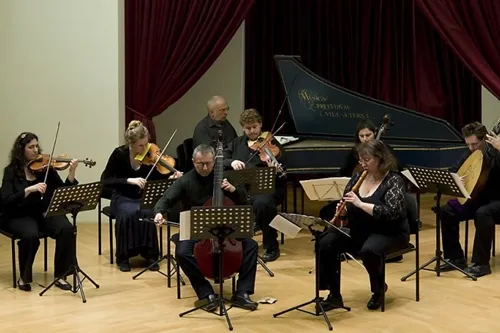
For over thirty years, the Jerusalem Baroque Orchestra has been dedicated to the field of baroque music, under the leadership of conductor-harpsichord player David Shemer. Founded in 1989, the ensemble aimed to showcase baroque works while entertaining the public. However, with their new series titled "Mr. Mozart & Dr. Haydn," the orchestra is expanding beyond their traditional repertoire.
The series consists of four concerts, starting with a performance at the Rappaport Hall in Haifa on June 24, followed by shows in Jerusalem, Tel Aviv, and Rehovot over the next three days, all starting at 8 p.m. The headline of the series reveals the genre, as Shemer steps aside from the conductor's podium on this occasion to make way for Zvi Meniker, a Russian-born, Germany-resident Israeli keyboardist. Meniker not only conducts but also takes on the role of soloist, performing on the fortepiano.
The fortepiano is an early version of the modern piano, which was widely used from the late 17th to the early 19th century. It was particularly favored by composers of the Classical period such as Haydn, Mozart, and Beethoven during his earlier years. Therefore, it is fitting for Meniker to play the fortepiano in a program that includes three works by Haydn and two by Mozart, including Mozart's Piano Concerto, K. 466 in D minor, and the Overture to Haydn's opera "L'isola disabitata" ("The uninhabited island").
Meniker has collaborated with the JBO on multiple occasions in the past. With his background of studying at the Salzburg Mozarteum and later attending the Zürich Academy of Music and completing a PhD at Cornell University, he seamlessly connects with the work of Austrian composers. Meniker has a strong affinity for Austrian composers and has written a dissertation on "Aspects of performance practice in Frédéric Chopin's piano works."
Meniker applauds the JBO's venture into the classical repertoire, although it seems it is not an entirely new endeavor for them. Meniker recalls a performance of a Mozart concerto with the orchestra in the 1990s, but it is only recently that the JBO has been regularly performing works from the classical repertoire.
When designing the program, Meniker aimed to provide audiences with a contrasting experience. He wanted to balance serious works with lighter pieces. The two Mozart compositions they will perform are serious and dramatic, including the piano quartet in G minor and the piano concerto in D minor. This is somewhat unusual for Mozart, who is primarily known for his joyful and positive major scale works.
On the other hand, the works by Haydn are more humorous, although not devoid of drama. The overture to "L'isola disabitata" is particularly dramatic, creating a program that thrives on contradictions.
The use of authentic period instruments adds to the listening experience, despite criticism from some quarters. Meniker defends their choice, emphasizing that these instruments were state-of-the-art during the time when the music was composed. During the baroque and classical periods, new music was constantly being written, and the instruments used were modern and innovative for that time. Meniker explains that the piano, in particular, was as cutting-edge as a modern synthesizer is today.
It is important to remember that when Mozart's works were originally written and performed, they were the popular music of the time. The concerts were intended for the general public, without the same reverence and formality we associate with classical music today. Meniker keeps this historical context in mind when selecting the repertoire for his performances.
Meniker will be joined on stage by 23 other instrumentalists, including his son, Lev Meniker, who plays the bassoon.



